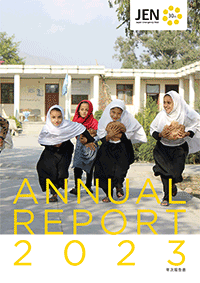To ensure that children can study in a safe and secure school
Our host community teams are engaged in the restoration and expansion of 11 public school buildings.
In Marw Basic School for Girls in Irbid province, on the border between Syria and Jordan, we’ve just completed a part of the restoration of classrooms and corridors. 318 students study in this school, both Jordanite and Syrian, from 6 to 12 years old.
Although the annual average temperature is quite alike between Tokyo and Amman, the capital city of Jordan, no air conditioners are installed in the classrooms. There’s no window glasses in the corridor sheltering from cold winds, which chill out the classroom, neither from rain which drenches the floors hazardously slippery.
Due to the restoration, window glasses with frames were built on the corridors to prevent rain and winds. The floors were refurnished too, paved with the high-strength, stain-free and anti-slip porcelain tiles, so that they can stay safe and clean for long time.
In this school, there is another construction ongoing to expand 4 more classrooms. 4 engineers of JEN have been working on the construction site day by day to ensure that Jordanite and Syrian children can concentrate on the study in a safe and secure environment.
As suggested by a white mortar part, the original corridor walls were too low to keep away children from falling over, or to prevent rain and wind from blowing in. It was especially dangerous in winter, when it rains so often. The floor was made of cement, which is easy to absorb the dirt, not hygienically ideal.
The corridors are reinforced with high walls and windows, so that no more rain and wind will blow into the classrooms. The floors are paved with porcelain tiles, which are very strong and hard to get stained and slippery.
The classrooms are repainted, the floors are repaired so that students can study in more hygienic environment.

![Jordan[Syrian refugees] Blog](/en/project/images/mainimg_project_jordan.jpg)








